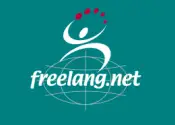Preamble
The present contract governs the use of the Freelang dictionary. You must read and accept the terms of this contract in order to download, install and use the Freelang dictionary, and, potentially, contribute to its development.
Definition of the Freelang dictionary
What is meant by the term "Freelang dictionary" is the bilingual dictionary distributed free of charge at the Freelang Web site (https://www.freelang.net) and downloadable in two parts: the program, and one or several lists of words (organized in two columns, one by language).
The authors
The program is the sole property of Beaumont ("Beaumont" being the pseudonym of the Freelang webmaster).
The lists of words are the property of their authors, they are not in the public domain.
The totality of the pages constituting the Freelang site (https://www.freelang.net) is the original work of Beaumont, with the exception of the contributions made available by users, which remain their property.
Freelang dictionary: outline of the concept
The Freelang dictionary is a contributory project, in which all users may participate. The objective is to make available on the Internet, free of charge, a maximum of bilingual lexicons, themselves composed of a maximum of words translated in the most precise manner possible.
Freelang offers its services in aiming at that objective:
- in putting at the disposal of Internauts a free program and lists of words easily modified by means of this program (thanks to its functions of addition, modification or deletion of translations);
- in helping users to create new lists of words for the Freelang dictionary;
- in integrating into the lists of existing words updates sent by users;
- in converting into the format of the Freelang dictionary lexicons already made by users in other formats.
Files distributed
The program is distributed in the form of a self-extracting archive ("dictionary_setup.exe") containing the files necessary for its installation. The lists of words are distributed independently, in the form of self-extracting archives (named "dic_[language].exe") containing the files necessary for their installation.
The program and the lists of words are distributed independently for reasons of convenience. Indeed, the program need be installed only one time, and the user then chooses to adjoin as many lists of words as are desired (one at a minimum).
The program and the lists of words must however be considered as an unbreakable totality, inasmuch as the program is necessary for the display of the lists, and the lists are necessary for the use of the program.
Principles of use
The use of the Freelang dictionary is governed by three principles: free access (and therefore the prohibition against its commercial exploitation), freeware status (freedom of distribution but prohibition against modifying the files) and copyright. The purpose of the present contract is to define the terms of application of these three principles.
If, after reading this contract, you are left with any doubts about the use of the dictionary, do not hesitate to contact us at this address: webmaster@freelang.net
We are generally very flexible and cooperative with respect to the use of the dictionary, but we may by the same token respond very firmly if by chance we discover that without our consent, a use thereof susceptible in our opinion to litigation has been made. Do not hesitate therefore to establish contact with us, and we will study the situation together.
Articles of the contract
Article 1
The Freelang dictionary is provided as is, without any warranty. The author can not be held responsible in case of damages of any nature whatsoever that may be sustained by the user or third parties and resulting directly or indirectly from its use.
We draw your attention to the fact that Freelang is a collective project, not for profit, and that the lists of words in the dictionary are not immune to errors or omissions, for which the authors or Freelang can not be held responsible, regardless of the circumstances.
Article 2
The Freelang dictionary is a freeware program. The program and the lists remain the property of their authors, and therefore must not be considered to be in the public domain. The special feature of the Freelang dictionary is that any user may become an author of or contributor to a list, and obtain rights to this list.
Article 3
As a freeware program, the Freelang dictionary may be freely distributed, provided that the files constituting it are not modified. You may therefore:
- download and use it free of charge, in a personal or professional capacity;
- make copies of it and transmit them freely;
- modify the lists of words for your convenience, using the functions for addition, deletion or modification of the program;
- create new lists of words, using the function of the program that permits this.
Article 4
Lists modified or created by users may not be distributed publicly (notably over the Internet) without the consent of Freelang. A private transmission or one done in a professional setting (business, school, university...) is on the other hand authorized.
A firm may therefore use the Freelang dictionary free of charge, and use it to develop a new list of words (technical vocabulary for example) for internal use, but it may not, on the other hand, put this lexicon at the disposal of the public (over the Internet for example) without our consent.
Article 5
The Freelang dictionary may be distributed at a Web site other that that of Freelang if the following conditions are respected:
- the names of the authors and contributors are mentioned;
- the origin of the dictionary is clearly indicated;
- a link is present pointing to the Freelang site (https://www.freelang.net);
- this link opens as a full screen or in a new window;
- the totality of the dictionary is distributed, that is, the program and at a minimum one list of words;
- the installation files are not modified.
Article 6
If the Freelang dictionary is distributed at a site for commercial purposes or for profit, the author must also, besides abiding by the conditions above, specify that the Freelang dictionary is free and that the lists of words are made by volunteer authors.
Article 7
Distribution of the Freelang dictionary on a CD-Rom identified as free accompanying a computer review or magazine is authorized.
Article 8
It is prohibited:
- to sell the Freelang dictionary;
- to charge for its use;
- to exploit it for commercial ends;
- to include it in a financial system of any nature whatsoever (appeals for donations, download access that requires clicking on sponsor banners, paid subscriptions, sale of a CD-Rom...).
Article 9
It is likewise prohibited:
- to distribute the Freelang dictionary without indicating the names of the authors of the lists of words;
- to distribute it without indicating the address of the Freelang Web site (https://www.freelang.net);
- to break up the program and the lists of words;
- to modify in any manner whatsoever the files constituting the program or the lists of words.
Article 10
Programs and "œuvres de l'esprit" in general are protected, in France, by the code of intellectual property.
The author is owner of a totality of rights, and is the only one who may decide what use shall be made of the work. This right does not require any formality of deposit; author's rights protect all original works as of their creation and independently of their disclosure.
The violation of one of the author's rights in the program is an offense of infringment prohibited in France by article L. 335-2 of the code of intellectual property (punishable by two years of imprisonment and a fine of 150,000 euros). The Freelang dictionary is a program protected in France by the laws on intellectual property and abroad by the international conventions on author's rights (Bern convention).
Article 11
The program remains the property of its authors, and the user therefore does not become its owner. It is consequently prohibited to modify, adapt, decompile or dissociate the different elements composing the program and the lists of words. The lists of words may therefore not be converted to and distributed in another format than that proposed by Freelang.
Article 12
Freelang encourages contributions from users of the dictionary to the enrichment of the lists of words, to the amelioration of their reliability and to the creation of new lists. This contribution may take several forms:
- sending of updates;
- creation of new dictionaries;
- sending of a dictionary that already exists to put it at the disposal of users.
In order that persons who contribute to Freelang retain control over the work of which they are the authors, the lists of words remain the property of their authors. It is however rare that a dictionary may be considered as a finished work, and the principle of the project put in place by Freelang supposes a nearly perpetual evolution of the lists of words. The principle that applies then is simple: every author exercises rights with respect to the part of a list that represents that person's own contribution.
Article 13
The code of intellectual property provides for three types of works when several authors are involved: collaborative work, composite work, collective work (Art. L. 113-2).
With respect to the principles set out in the preceding article, the lists of words distributed at the Freelang site may be considered, when several authors are involved, either as collaborative works (if the authors have worked together) or as composite works (if several authors have worked successively).
Article 14
By the nature of the concept described in the present contract, the dictionaries entrusted to Freelang are susceptible to being updated without notice (even if, in fact, we are in the habit of warning authors and sometimes subjecting updates to their approval). It is therefore the responsibility of all authors to preserve (by computer or other supports) the completeness and integrity of any list for which they may plan to assert their rights.
Article 15
Freelang, in the person of its webmaster, is committed:
- to protecting as well as possible the rights of the authors contributing to the project;
- not to carry out any commercial exploitation of the dictionaries entrusted to it;
- to make mention of the authors contributing to the lists of words, absent explicit opposition on their part;
- to carry out, on simple demand of an author, one conversion of the list that that person has made to a current format (plain text, Excel...).
Article 16
Only the authors decide what use shall be made of the list of words that they have made. They are therefore not subject, with respect to their own production, to the prohibitions enunciated in articles 8 and 9 of this contract.
Article 17
Only the authors are in a position to authorize the distribution or the exploitation of their lists of words by third parties. Freelang may however play the role of counselor to the authors or substitute for them if they so wish.
Article 18
The authors are entitled to carry out commercial exploitation of the parts of a list corresponding to their contribution. In the case of a list having several contributors and if the totality of the list is susceptible to being commercially exploited, the agreement of all the participants is necessary.
Article 19
Use of the dictionary and/or participation in the Freelang project through the sending of a contribution represents acceptance of this usage contract.
Article 20
This usage contract shall be construed, interpreted and governed by the laws of France.
I acknowledge that by clicking "I agree", I accept all the terms and conditions of this contract.
- I agree -

